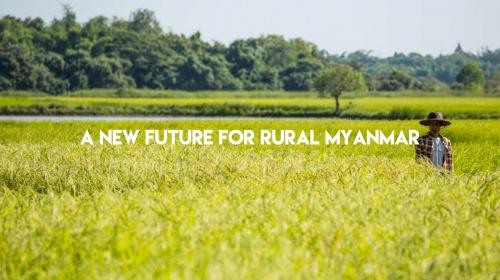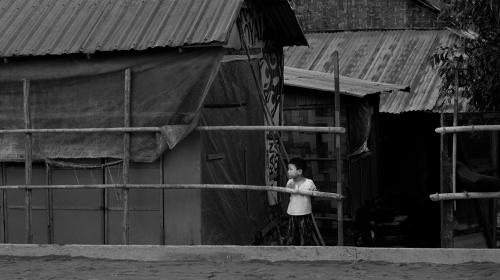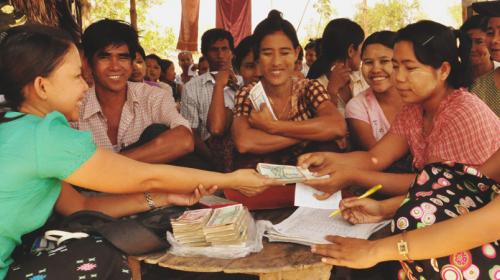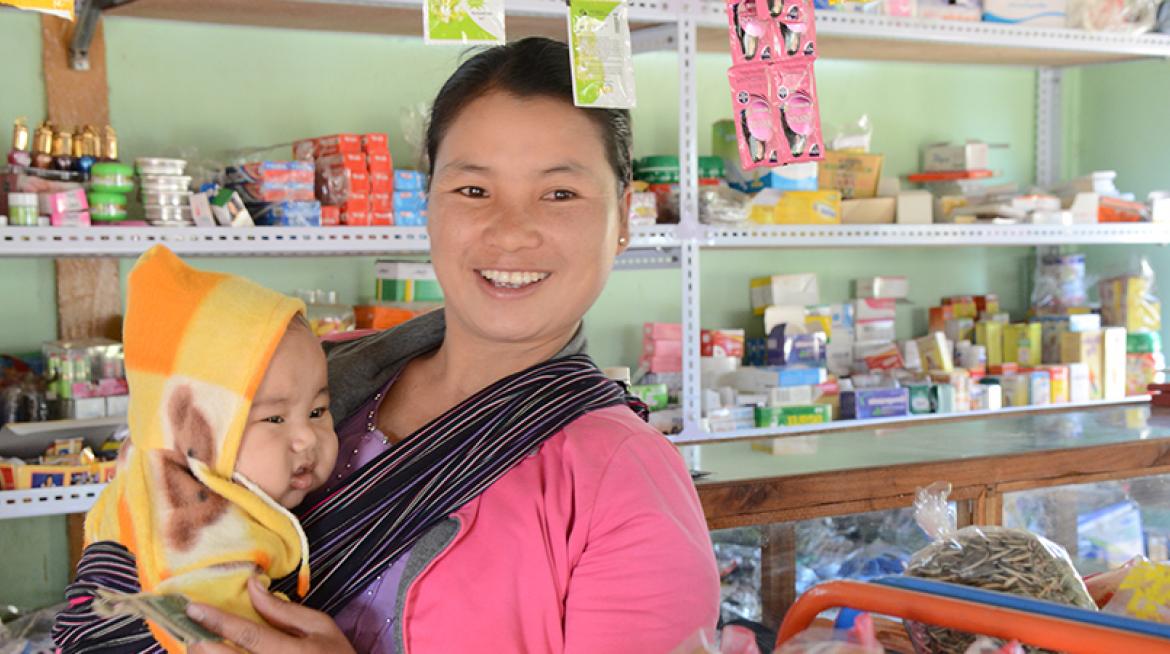
Running a grocery store was Mu Karen’s dream ever since she was married. Now, her dream is a reality.
Thirty-one year old Mu Karen is a young, rural entrepreneur who says she always tries to set goals she can achieve.
“We could not depend only on the income of my husband. I have five children. Three are studying in primary and one in kindergarten. The youngest is still being breastfed. I have high hopes for their education. So I need to find a way to make it happen,” she said.
Mu was helping her husband on their five acre farm growing rice for consumption and corn for family income for two years after they got married a decade ago. Her husband is a skilled farmer and she felt she could not contribute much to decision-making for the farm. They earn very little from the farm as they share the income with their parents.
Their house is located on the main road of Done Ka Mee Village, heading to Demoso Town in Kayah State, a good location for running a business. So, Mu identified that setting up a grocery store in front of their house would help the family build their income. Her plan was just an idea without any cash in hand. So she asked for help from her father-in-law for the initial investment of around MMK 700,000.
“I am very lucky to have supportive family members. My father-in-law allowed me to open the shop, but it was behind our house. As a result, it was not visible enough.” The first trial of a very small shop with two shelves set up at the backside of the house was not really a success. People did not have much time to go shopping during planting season so Mu’s shop had to rely on business during the monsoon. With a limited budget, she could not put many items on the shelves and her customers became fewer and fewer. But she did not give up her hope and convinced family members with her business vision to continue and further develop her business.
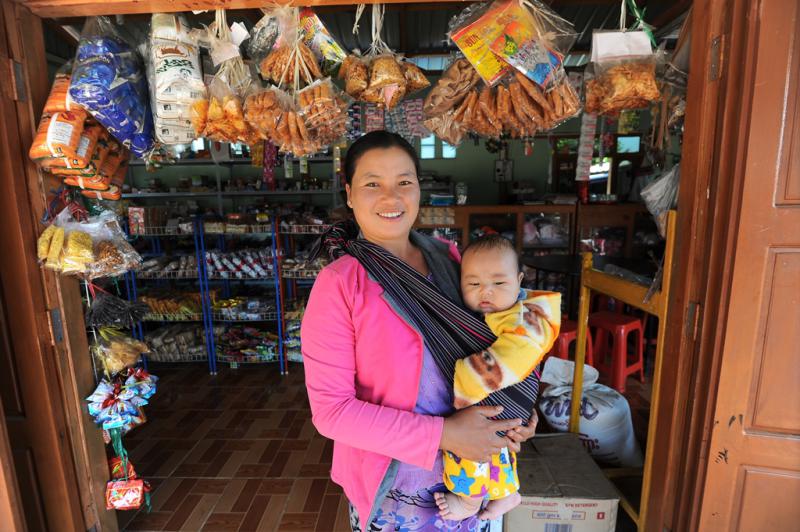
“I don’t want to borrow money from the informal lenders. They do not have any set disciplines for repayment. So I think it makes people disorganised about repaying back regularly and the length of the loans become long. The longer time you take to repay, the higher your debt will be,” she said.
When VisionFund Myanmar (VFM) introduced microfinance services to the Done Ka Mee Village in 2016, the chairman of village passed the information to Mu Karen. After checking VisionFund’s loans terms and conditions, Mu felt it would be convenient for her to make repayments monthly and manage repayments with her income from the shop. To begin with Mu could borrow MMK 300,000 as a member of a group for small business loans, and repay monthly over six months.[1] The business loan finally helped her to make her dream come true. Gradually, she could move her shop to the main road and build the stock on her shelves.
“I go to two big markets, depending on which items I need for the shop. The price and quality of the product are my criteria for buying. This way, I can sell them back for a good price and my customers get fresh products.”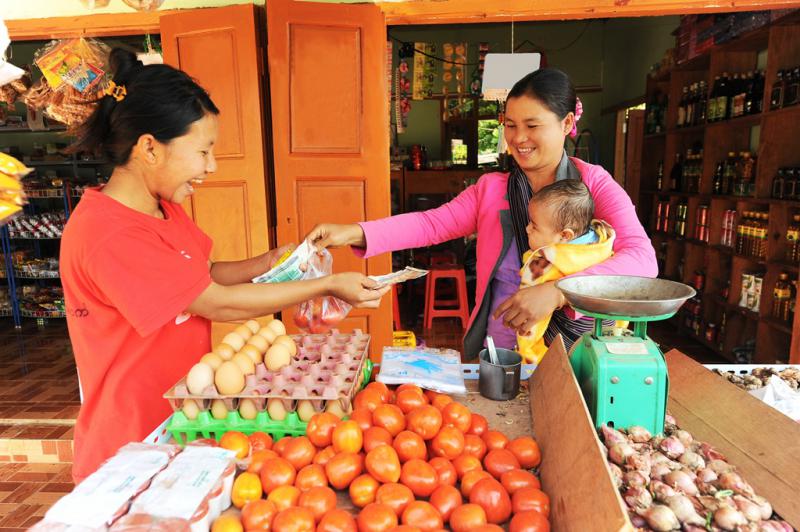
The cheerful business woman always listens to her customers’ feedback and suggestions. “Live with what your customers need” is her motto for running a grocery store in the village. By updating the shop with items the market demands, her business is on the right track. The earnings from the business have become the family’s main income source. Because of her regular repayments as well as her increased income from the shop, she can now access an individual loan for small business.
“I am still in debt and it makes me motivated. It means that I have to put more effort into my business to run well all the time. I will repay back MMK 1,800,000 [2]to VisionFund over the course of eight months. I made repayments for two months already”. The amount and date for each round is clearly written in the VisionFund passbook and this helps her to manage the monthly repayment.
With good earnings from the shop, her ambition has grown. There is only one fabric shop in the area and only Kayah traditional clothing is available there.
“In our village and the nearby area, there are a lot of people from the Kayan tribe. My customers also request me to sell fabrics and I am really confident that expanding my shop with Kayan traditional clothing will create smiles for all,” she said.
Because of her proven business competence, family members do not intervene when it comes to her ideas for the shop.
“My shop is getting busy. As it is on the main road, sales happen all the time during business hours – from 6am to 7pm. During peak season like monsoon, my customers wake me up to get the goods they want. I have to ask my husband to help me in the shop at times when there are many customers.”
She is a reliable business advisor to young and energetic women in the village. “I helped women in the village with some suggestions and ideas how they could start or expand their businesses. Just recently I suggested a friend of mine to expand her motorbike accessories shop as motorbikes are now increasingly used in our area.”
Mu married in her teenage years when she finished high school. However, she could not continue to university because of housework. Mu nevertheless did not stop reading because of her high hope for her children’s future.

With her business stable, she is more involved in community and religious activities. She can now allocate her free time to her children and help them in their study.
Mu was one of the clients of VisionFund Myanmar in Demoso Township, Kayah State. Kayah is located in the uplands region, which is underserved by financial services, both formal and informal. Only 13 per cent of households have access to formal services (9 per cent through state or private banks and 4 per cent through registered cooperatives, pawn shops and microfinance institutions). Around 38 per cent of the population has access to informal loan services, but the majority is excluded from both formal and informal financial services.[3] With LIFT’s support, VFM is enabling increased access to affordable and sustainable financial services in rural townships in the uplands region. Availability of, and increased access to, finance undeniably empowers communities for better lives.
As of 2017 June, LIFT’s financial inclusion partners - microfinance institutions, local banks and cooperatives – have reached over 1.7 million clients across the country and 90 per cent of these clients are women.
[1] A group loan can be accessible by a number of members from 3 to 15 people as a group (VisionFund’s loan products 2016)
[2] This is the third loan cycle for Mu. VFM assess the client’s income condition for repayment in agreed timeframe. Mu’s shop was running very well, so the loan size she received in the third cycle was bigger.
[3] FinScope Myanmar, UNCDF (2013)

